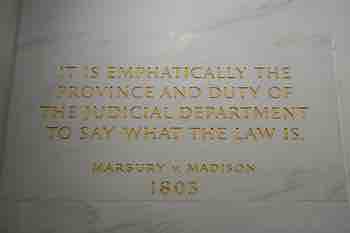Judicial federalism relies on the fact that the judiciary has a place in the check and balance system within the federal government. Much of judicial federalism is dependent on judicial review as well as other acts defining the judiciary's role in the U.S. government.
The first Congress passed the Judiciary Act of 1789, which established the lower federal courts and specified the details of federal court jurisdiction. Section 25 of the Judiciary Act provided for the Supreme Court to hear appeals from state courts when the state court decided that a federal statute was invalid or when the state court upheld a state statute against a claim that the state statute was repugnant to the Constitution. This provision gave the Supreme Court the power to review state court decisions involving the constitutionality of both federal and state statutes. The Judiciary Act thereby incorporated the concept of judicial review.
Judicial review in the United States refers to the power of a court to review the constitutionality of a statute or treaty or to review an administrative regulation for consistency with a statute, a treaty, or the Constitution itself.
The United States Constitution does not explicitly establish the power of judicial review. Rather, the power of judicial review has been inferred from the structure, provisions, and history of the Constitution.
The Supreme Court's landmark decision on the issue of judicial review was Marbury v. Madison (1803) , in which the Supreme Court ruled that the federal courts have the duty to review the constitutionality of acts of Congress and to declare them void when they are contrary to the Constitution. Marbury, written by Chief Justice John Marshall, was the first Supreme Court case to strike down an act of Congress as being unconstitutional. Since that time, the federal courts have exercised the power of judicial review. Judicial review is now a well settled doctrine. As of 2010, the United States Supreme Court had held some 163 Acts of the U.S. Congress unconstitutional.

Marbury v. Madison Placard
Marbury vs. Madison changed the role of the judicial branch in the federal system.
Although the Supreme Court continues to review the constitutionality of statutes, Congress and the states retain some power to influence what cases come before the Court. For example, the Constitution at Article 3, Section 2, gives Congress power to make exceptions to the Supreme Court's appellate jurisdiction. The Supreme Court has historically acknowledged that its appellate jurisdiction is defined by Congress. Therefore, Congress may have power to make some legislative or executive actions non-reviewable. This is known as jurisdiction stripping.